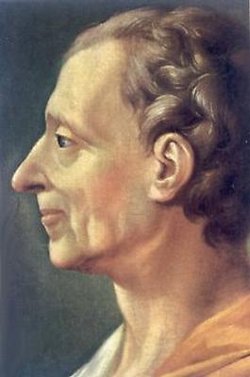Well, in History class...I just landed myself with another project. No one wants to talk about History, unless it somehow relates to wars and deaths that affected thousands of people all over the country or world. There could also be some historical characters in countries such as King Henry VIII, famous for having a total of six wives, landed him with only one son, who died at a young age, and two daughters, the future Queen Mary I and Queen Elizabeth I. So I for one, might as well as talk about this historical figure I will be “impersonating” as for a debate.
Montesquieu believed that all things were made up of rules or laws that never changed. He set out to study these laws scientifically with the hope that knowledge of the laws of government would reduce the problems of society and improve human life. According to Montesquieu, there were three types of government: a monarchy (ruled by a king or queen), an aristocracy (ruled by the noble or wealthy class), and a republicanism (ruled by elected leaders). Montesquieu believed in democracy, which is now used today in the US government.
